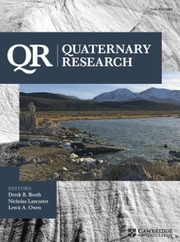Crossref Citations
This article has been cited by the following publications. This list is generated based on data provided by
Crossref.
Goff, J. R.
and
McFadgen, B. G.
2001.
Catastrophic seismic-related events and their impact on prehistoric human occupation, coastal New Zealand.
Antiquity,
Vol. 75,
Issue. 287,
p.
155.
McMillan, Alan D.
and
Hutchinson, Ian
2002.
When the Mountain Dwarfs Danced: Aboriginal Traditions of Paleoseismic Events along the Cascadia Subduction Zone of Western North America.
Ethnohistory,
Vol. 49,
Issue. 1,
p.
41.
Goff, James R.
and
McFadgen, Bruce G.
2003.
Large earthquakes and the abandonment of prehistoric coastal settlements in 15th century New Zealand.
Geoarchaeology,
Vol. 18,
Issue. 6,
p.
609.
Butler, Virginia L.
and
Campbell, Sarah K.
2004.
Resource Intensification and Resource Depression in the Pacific Northwest of North America: A Zooarchaeological Review.
Journal of World Prehistory,
Vol. 18,
Issue. 4,
p.
327.
Losey, Robert J.
2005.
Earthquakes and tsunami as elements of environmental disturbance on the Northwest Coast of North America.
Journal of Anthropological Archaeology,
Vol. 24,
Issue. 2,
p.
101.
Lepofsky, Dana
Lertzman, Ken
Hallett, Douglas
and
Mathewes, Rolf
2005.
Climate Change and Culture Change on the Southern Coast of British Columbia 2400-1200 Cal. B.P.: An Hypothesis.
American Antiquity,
Vol. 70,
Issue. 2,
p.
267.
McFadgen, Bruce G.
and
Goff, James R.
2005.
An earth systems approach to understanding the tectonic and cultural landscapes of linked marine embayments: Avon‐Heathcote Estuary (Ihutai) and Lake Ellesmere (Waihora), New Zealand.
Journal of Quaternary Science,
Vol. 20,
Issue. 3,
p.
227.
Halkon, Peter
and
Innes, Jim
2005.
Settlement and economy in a changing prehistoric lowland landscape: an East Yorkshire (UK) case study.
European Journal of Archaeology,
Vol. 8,
Issue. 3,
p.
225.
Peters, Robert
Jaffe, Bruce
and
Gelfenbaum, Guy
2007.
Distribution and sedimentary characteristics of tsunami deposits along the Cascadia margin of western North America.
Sedimentary Geology,
Vol. 200,
Issue. 3-4,
p.
372.
McFadgen, B.G.
and
Goff, J.R.
2007.
Tsunamis in the New Zealand archaeological record.
Sedimentary Geology,
Vol. 200,
Issue. 3-4,
p.
263.
Ludwin, Ruth S.
Smits, Gregory J.
Carver, D.
James, K.
Jonientz-Trisler, C.
McMillan, A. D.
Losey, R.
Dennis, R.
Rasmussen, J.
De Los Angeles, A.
Buerge, D.
Thrush, C. P.
Clague, J.
Bowechop, J.
and
Wray, J.
2007.
Folklore and earthquakes: Native American oral traditions from Cascadia compared with written traditions from Japan.
Geological Society, London, Special Publications,
Vol. 273,
Issue. 1,
p.
67.
Hutchinson, Ian
and
Crowell, Aron L
2007.
Recurrence and Extent of Great Earthquakes in Southern Alaska During the Late Holocene from an Analysis of the Radiocarbon Record of Land-Level Change and Village Abandonment.
Radiocarbon,
Vol. 49,
Issue. 3,
p.
1323.
Bird, Deanne
and
Dominey-Howes, Dale
2008.
Testing the use of a ‘questionnaire survey instrument’ to investigate public perceptions of tsunami hazard and risk in Sydney, Australia.
Natural Hazards,
Vol. 45,
Issue. 1,
p.
99.
McCalpin, James P.
2009.
Paleoseismology.
Vol. 95,
Issue. ,
p.
29.
Hutchinson, Ian
and
Attenbrow, Val
2009.
Late-Holocene mega-tsunamis in the Tasman Sea: an assessment of the coastal archaeological record of New South Wales.
The Holocene,
Vol. 19,
Issue. 4,
p.
599.
McCalpin, James P.
2009.
Paleoseismology.
Vol. 95,
Issue. ,
p.
1.
Dallimore, Audrey
and
Jmieff, Danielle G.
2010.
Canadian west coast fjords and inlets of the NE Pacific Ocean as depositional archives.
Geological Society, London, Special Publications,
Vol. 344,
Issue. 1,
p.
143.
Ewonus, Paul A.
Cannon, Aubrey
and
Yang, Dongya Y.
2011.
Addressing seasonal site use through ancient DNA species identification of Pacific salmon at Dionisio Point, Galiano Island, British Columbia.
Journal of Archaeological Science,
Vol. 38,
Issue. 10,
p.
2536.
Zhang, Zhen Ke
Xie, Li
Zhang, Yun Feng
Zhang, Ling Hua
and
Lu, Ji Xin
2012.
Echo Sounder Survey in Dongzhai Bay to Detect the Earthquake Event in 1605, Hainan, South China.
Applied Mechanics and Materials,
Vol. 239-240,
Issue. ,
p.
115.
Ramírez-Herrera, María-Teresa
Lagos, Marcelo
Hutchinson, Ian
Kostoglodov, Vladimir
Machain, Maria Luisa
Caballero, Margarita
Goguitchaichvili, Avto
Aguilar, Bertha
Chagué-Goff, Catherine
Goff, James
Ruiz-Fernández, Ana-Carolina
Ortiz, Modesto
Nava, Hector
Bautista, Francisco
Lopez, Gloria I.
and
Quintana, Patricia
2012.
Extreme wave deposits on the Pacific coast of Mexico: Tsunamis or storms? — A multi-proxy approach.
Geomorphology,
Vol. 139-140,
Issue. ,
p.
360.


